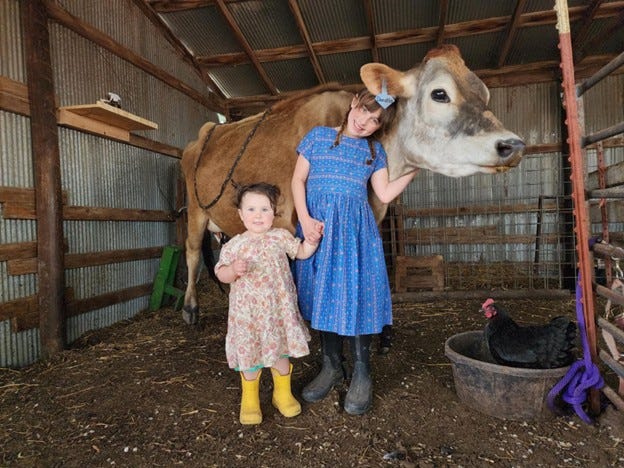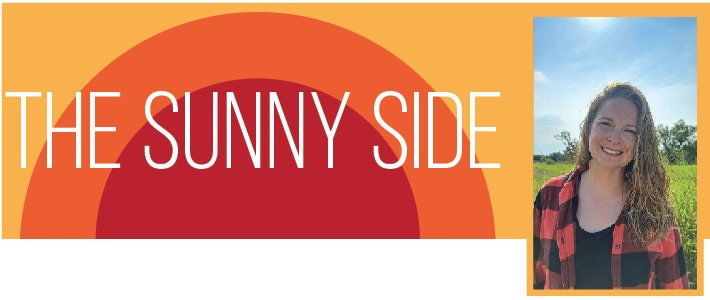Voices From the Homestead—Part Two
Facing Hard Questions Together
The following article appeared in the print issue of Ponca City Monthly magazine, which includes hyperlocal stories about Ponca City. Get full access to all online articles, videos, and content by becoming a paid subscriber. We offer free and paid subscription plans. Find rack locations to pick up your free print copy here, or subscribe here to get online access plus exclusive content.
Welcome to “The Sunny Side” where we’ll chat about all things homesteading! My name is Liz Threlkeld and I have been homesteading with my family in small forms or large fashions for most of my life. From growing gardens to DIY projects, to cooking and preserving, to raising and processing our own meat animals, we’ve learned a thing or two along the way. I’m excited to get to share some of this life with you. Ready? Let’s grow!
Hello, Friends!
I just love the saying, “We are better together.” Promoting collaboration and higher ways of thinking are what I am all about. When it comes to tough questions, I want to know others’ opinions on the matter. It helps me to think rationally and avoid getting pigeon-holed into a poor train of thought. So, adventure with me into “Part TWO” of exploring some hard questions with fellow, local homesteaders!
Food Choices & Impact
Do my food choices support local, seasonal eating, ethical harvesting and fair trade or am I contributing to a larger carbon footprint by demanding out-of-season imports?
“With the majority of my food choices, I try to support seasonal eating by buying local, fresh things as much as possible. It is really important to me that my food is harvested ethically using fair trade growing practices. I do struggle with buying ethnic food that is not local. Plus, since I am trying to be as dairy-free as possible, I get products that are coconut-based, and those are coming from much further distances. It’s a challenge, but I think being mindful of our choices is the best first step!” ~ Rachel Prout, Ponca City

Would we have less of a hunger crisis if more people knew how to forage/grow food?
“Absolutely! One of the biggest contributors to the hunger crisis isn’t that there’s not enough food, but that supply chains are fragile and there often isn’t enough access to fresh food in many parts of the U.S. Much of Oklahoma is considered a food desert because of this lack of access. Supplementing our food supply chains with local growers makes them more resilient when crisis hits.” ~ Matt Hakola, Ragtag Resilience
Is it important to me to know how to grow/procure food?
“In 1999, the Y2K scare led my family to worry about potential food shortages, making me realize the importance of a stable food supply chain. The COVID-19 pandemic further highlighted this issue, disrupting the agriculture market and causing food insecurity worldwide. Knowing how to grow your own food provides a sense of control, improved health, sustainability and self-sufficiency.” ~ Courtney Chrisman, Kaw City
Environmental Responsibility
Am I improving soil health or only extracting from it?
“I hope that I am improving it. I don’t use harsh chemicals to kill weeds; I pull them by hand. I don’t use pesticides; I usually let the bugs do their thing. If you want ladybugs but kill off their source of food (aphids), how do you expect them to survive in your garden? I use cover crops, mulch and composted kitchen scraps, leaves, grass clippings, cow/pig/chicken poo. No matter how many things you grow, your crops won’t be abundant if you don’t feed the soil.” ~ Anonymous, Ponca City
Are we rushing the growth of our plants with synthetic fertilizers?
“I believe commercial growing practices have normalized the use, availability and ease of synthetic fertilizers. And even if the fruits and vegetables grown with synthetic fertilizers look fantastic, their nutritional content is not as high as smaller, uglier foods grown in naturally amended and composted soils.” ~ Kat Long, Ponca City
Animal Welfare
Do I respect the animals that provide for me?
“Yes, because they will give you that respect in return. I always find the better you take care of your animals, the more they will give back. Animals should have fresh, clean air, water, pasture and be able to go in the sunshine. The way I see it is, the happier your animals are, the happier you will be.” ~ Dave Oatman, Ponca City
Am I more concerned with making my animals comfortable than I am with making them healthy?
“A proper ratio of hoof to soil space creates a regenerative system which keeps livestock comfortable, as well as healthy, so I would hope the two go hand in hand. We try our best to mimic nature which creates strong, healthy, sustainable herds and flocks, while the natural environment would keep them comfortable, especially compared to confined spaces that become degraded over time.” ~ Blaze Baxter, Bad Baxter Farm
Better Together,
Liz Threlkeld
➡️ Opt in or out of different newsletters on your “My Account” page.
➡️ Learn more about Ponca City Monthly+
Ponca City Monthly is a locally owned publication that delivers hyperlocal news in print and online.
Like what we are doing? Feel free to forward this along and tell a friend.
Sponsorship information/customer service: email editor@poncacitymonthly.com



